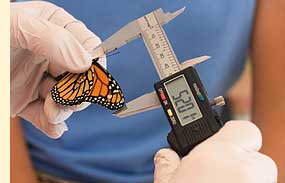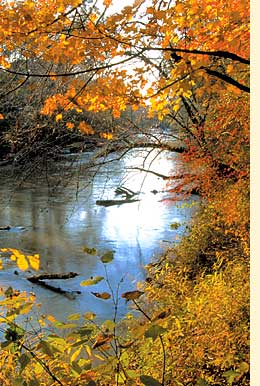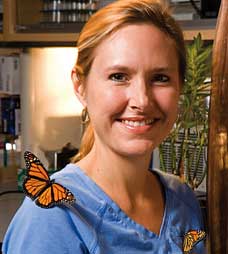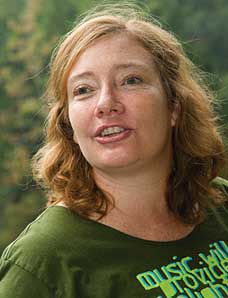Ecology Thrives at UGA
Embracing Odum’s holistic vision
page 2
 Altizer, Gittleman, other faculty and students are also combing over previously published journal articles and compiling a database that allows researchers to look for global-scale patterns in infectious diseases in wild mammals. Already, the researchers have found that viruses and bacteria carried by domesticated animals often pose the greatest threats to wild animals in danger of extinction. But “the good news,” says Altizer “is that reducing their contact with domesticated animals could go a long way toward preventing infectious disease epidemics in wildlife populations.”
Altizer, Gittleman, other faculty and students are also combing over previously published journal articles and compiling a database that allows researchers to look for global-scale patterns in infectious diseases in wild mammals. Already, the researchers have found that viruses and bacteria carried by domesticated animals often pose the greatest threats to wild animals in danger of extinction. But “the good news,” says Altizer “is that reducing their contact with domesticated animals could go a long way toward preventing infectious disease epidemics in wildlife populations.”
Researchers at the Odum School are also studying diseases that affect humans. Pej Rohani, for example, has created mathematical models that help explain how outbreaks of the potentially deadly mosquito-borne dengue fever occur. John Drake is studying West Nile virus in New York City. And Gittleman is creating a model that examines how socioeconomic, environmental, and ecological factors contribute to the emergence of new diseases worldwide. One of its main purposes is to allow public health officials to concentrate scarce resources on parts of the world that are most at risk.
Aquatics: Protection Services
The interconnectedness that ecologists talk about is evident in the often-unseen role that shrimp, crayfish, clams, and other aquatic creatures play in keeping our drinking water clean. By filtering out suspended organic matter and pathogens that would otherwise flow downstream—with possible deleterious effects—these freshwater invertebrates perform valuable ecosystem services that have measurable economic value, says aquatic ecologist Alan Covich. “When we say ‘the ecosystem is greater than the sum of its parts,’” he notes, “we’re not just talking abstractly. We’re talking about real societal issues.”
 In the Flint River Basin in Southwest Georgia, the region’s long-standing drought has greatly reduced stream flow. The situation there may get worse yet, as climatologists predict that global warming will likely make droughts more common in the future.
In the Flint River Basin in Southwest Georgia, the region’s long-standing drought has greatly reduced stream flow. The situation there may get worse yet, as climatologists predict that global warming will likely make droughts more common in the future.
Working at the Joseph W. Jones Ecological Research Center, a 29,000-acre outdoor laboratory on the Flint funded by the Robert W. Woodruff Foundation, Covich’s students and colleagues are exploring whether natural processes of biofiltration among native and non-native filter-feeding species are at risk during prolonged droughts.
Such research need not be limited to Georgia. The benefits of studying ecosystems in other parts of the world become clear when Covich talks about work he has done over the past 20 years in Puerto Rico, where he demonstrated the effects of different filter-feeding species on streamwater clarity both during floods and droughts. In these tropical streams, several species of freshwater shrimp use fan-like appendages to filter leaf fragments, bacteria, and other organic matter from streams. But when streamflow drops below a critical level, the shrimp stop their filtering activities and instead scrape organic matter from rocks and decomposing leaves. Covich’s work shows that managing river flows to retain essential species and their functions is critical for economic and ecological sustainability.
Sustainability: Actions Based on Sound Science
Part of the appeal of ecology to the wider community is its relevance to daily life, nowhere more evident than in the outreach work conducted by the Odum School’s River Basin Center (RBC). “We are a team of aquatic ecologists, land-use lawyers, and outreach specialists that helps stakeholders manage the land to protect water quality and biodiversity,” says RBC co-director Laurie Fowler. “Also, our colleagues in forestry, agriculture, and environmental design are generous in sharing their expertise, and our students are involved every step of the way.”
In North Georgia’s Etowah watershed, for example, development threatened the habitat—and the survival—of a tiny, indigenous fish species, the darter. When county commissioners realized that economic growth would grind to a halt if they were to run afoul of the federal Endangered Species Act, they asked the RBC for help.
The center’s first task was to figure out why development was harming darter populations; its investigators discovered that culverts across streambeds isolate the fish, thereby reducing their ability to breed. The RBC staff then worked with UGA engineers to develop guidelines for culverts that allow fish to swim freely through. The researchers also determined that pollution and sediment carried by stormwater runoff were a threat, so they worked with engineers and developers to promote the infiltration of stormwater into the local soil. Fowler says this final stage, which involved development of laws based on sound research, is what distinguishes the RBC from other programs.
Looking toward the future, the center is planning projects to mitigate the effects of global warming by preserving coastal land that is currently dry but likely to become protective marshland after sea-level rise. The RBC is also working to reduce stormwater runoff on the coast and to protect urban streams.
Anticipating future needs is part of the Odum School’s mission, says Fowler, and it follows the example of the school’s namesake. “We have phenomenal young faculty and we are forward-thinking. But I love that sometimes at faculty meetings, we find ourselves asking ‘What would Gene [Odum] do?’ To me, that’s just a great legacy.”
(Sam Fahmy is a UGA science writer and frequent contributor to ugaresearch.)
 |



